小学六年级英语词性变换
六年级英语形容词词性转换单选题50题

六年级英语形容词词性转换单选题50题1. Tom runs very ____. He always wins the running race in school. (quick)A. quickB. quickerC. quickly答案:C。
解析:形容词quick变为副词时,直接在词尾加-ly,即quickly。
在这个句子中,需要一个副词来修饰动词runs,表示跑得很快,quick是形容词不能修饰动词,quicker是比较级形式在此处也不合适,所以答案是quickly。
2. My mother cleans the house ____. (careful)A. carefulB. carefullyC. more careful答案:B。
解析:careful是形容词,其变为副词的规则是在词尾加-ly,变成carefully。
句子中需要副词来修饰动词cleans,表示妈妈仔细地打扫房子,careful是形容词不能修饰动词,more careful是比较级形式不符合句子要求,所以答案是carefully。
3. The students are listening to the teacher ____ in class. (quiet)A. quietB. quietlyC. more quietly答案:B。
解析:quiet是形容词,变为副词时直接加-ly,即quietly。
此句中需要副词来修饰动词listen,表示学生们安静地听老师讲课,quiet是形容词不能用于修饰动词,more quietly是比较级形式这里不需要,所以答案是quietly。
4. She answered the question ____. (easy)A. easyB. easierC. easily答案:C。
解析:easy变为副词的规则是把y变为i再加-ly,即easily。
在这个句子里需要副词来修饰动词answered,表示她轻松地回答了问题,easy是形容词不能修饰动词,easier是比较级形式不符合题意,所以答案是easily。
六年级英语词性转换

六年级英语(上)期中复习词性转换:1. meet vt. 遇见meeting n. 会议2. married a. 已婚的marry v.结婚3. introduce vt.介绍introduction n. 介绍4. English n. 英语a. 英国的England n. 英格兰5. friend n. 朋友friendly a. 友好的6. monitor n. 男班长monitress n. 女班长7. teach vt. 教teacher n. 教师8. visit v./ n. 参观;访问visitor n. 游客9. weigh v. 称重为weight n. 重量10. certainly ad. 当然certain a. 必然的11. given a. 给予的give v. 给12. nationality n. 国籍nation n. 国家national a. 国家的13. age n. 年龄aged a. 年老的14. help v./n. 帮助helpful a. 有帮助的helpless a. 无助的helper n.帮手15. favourite a. 特别喜欢的favour n. 喜爱16. activity n. 活动act v. 表演actor n. 男演员actress n. 女演员action n. 行动17. child n. 孩子复数:children18. manager n. 经理manage v. 管理19. person n. 人personal a. 个人的20. appearance n. 外貌appear vi. 出现disappear vi. 消失reappear vi. 再现21. engineer n. 工程师engine n. 引擎22. artist n. 艺术家art n. 艺术23. music n. 音乐musical n. 音乐剧 a. 音乐的musician n. 音乐家24. usually ad. 通常usual a. 通常的25. fun n. 有趣的人(事物)funny a. 可笑的26. sing v. 唱歌singer n. 歌手song n. 歌曲27. happy a. 高兴的unhappy a. 不高兴的。
六年级英语词性转换
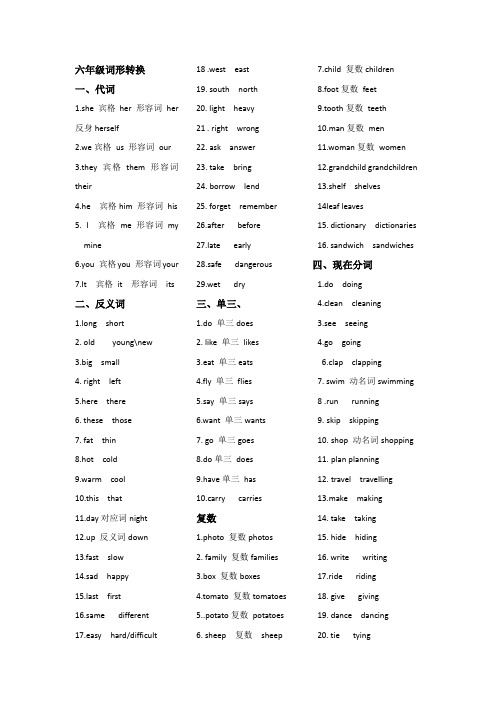
六年级词形转换一、代词1.she 宾格her 形容词her 反身herself2.we宾格us 形容词our3.they 宾格them 形容词their4.he 宾格him 形容词his5. I 宾格me 形容词my mine6.you 宾格you 形容词your7.It 宾格it 形容词its二、反义词1.long short2. old young\new3.big small4. right left5.here there6. these those7. fat thin8.hot cold9.warm cool10.this that11.day对应词night12.up 反义词down13.fast slow14.sad happyst first16.same different17.easy hard/difficult 18 .west east19. south north20. light heavy21 . right wrong22. ask answer23. take bring24. borrow lend25. forget remember26.after beforete early28.safe dangerous29.wet dry三、单三、1.do 单三does2. like 单三likes3.eat 单三eats4.fly 单三flies5.say 单三says6.want 单三wants7. go 单三goes8.do单三does9.have单三has10.carry carries复数1.photo 复数photos2. family 复数families3.box 复数boxes4.tomato 复数tomatoes5..potato复数potatoes6. sheep 复数sheep7.child 复数children8.foot复数feet9.tooth复数teeth10.man复数men11.woman复数women12.grandchild grandchildren13.shelf shelves14leaf leaves15.dictionary dictionaries16.sandwich sandwiches四、现在分词1.do doing4.clean cleaning3.see seeing4.go going6.clap clapping7. swim 动名词swimming8 .run running9.skip skipping10.shop 动名词shopping11.plan planning12.travel travelling13.make making14. take taking15. hide hiding16. write writing17.ride riding18. give giving19. dance dancing20. tie tying21.shine shining22.practise practising五、缩略和完整形式1. they’ re they are2..do not don’ t3. can’t can not4. here’s here is5. there’re there are6. aren’t are not7. let’s let us8. doesn’t does not9. we’re we are10. couldn’t could not11 where’s where is12. who’s who is13.I’ll I will14.I’d I would15. TV television16.didn’t did not17.haven’t have not18.hasn’t has not19.September Sept.六、同音词1. too two \to2.. no 同音词know3.. there同音词their4.. buy 同音词by bye5..write 同音词right6. meat 同音词meet7.four同音词for 8. see 同音词sea9. one won10.hour our11.wear where七、过去时1. live过去式lived2. carry carried3. study studied4. carry carrieddance danceddecide decided5.travel travelled6. stop stopped7. hop hopped8. skip skippedplan plannedshop shoppeddrop dropped9.. am/is was are were10. come came11 have had12. go went13. see saw14. sing sang15. eat ate16. drink drank17. take took18. fall fell19. find found20. buy bought21. teach taught22. learn learnt\learned23. ride rode24. draw drew25. win won26. swim swam27. meet met28. run ran29. lose lost30. say said31. make made32. feel felt33. get got34. do/does did35.fly flew36.cut cut37.put put38.read read39.write wrote40.wear wore41.can could42.tell told43.tie tied44.become became45.spend spent46.bring brought47.send sent八、其它1. China形容词Chinese2.happy副词happily 名词happiness3.real副词really4.bad 副词badly5.good 副词well比较级better最高级best6.many\much比较级more 最高级most7.little 比较级less8.one 序数词first9.two 序数词second10.third基数词three11..health 形容词healthy12.dance 名词dancer13.work名词worker14.farm 名词farmer15.act 名词actor16.teach名词teacher.17.win 名词winner18.run名词runner19..building动词build20..photo同义词picture21.study 同义词learn22.hat 同义词cap23.love 同义词like24.America人的名词American25.. fun形容词funny26.love 形容词lovely27.break 形容词broken28.loud 副词loudly29..sun形容词sunny30..snow形容词snowy31.rain 形容词rainy32.wind 形容词windy。
词性转换总结与归纳总结
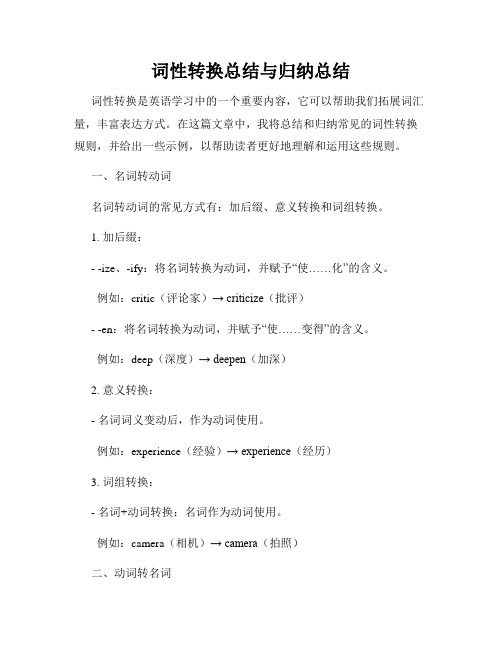
词性转换总结与归纳总结词性转换是英语学习中的一个重要内容,它可以帮助我们拓展词汇量,丰富表达方式。
在这篇文章中,我将总结和归纳常见的词性转换规则,并给出一些示例,以帮助读者更好地理解和运用这些规则。
一、名词转动词名词转动词的常见方式有:加后缀、意义转换和词组转换。
1. 加后缀:- -ize、-ify:将名词转换为动词,并赋予“使……化”的含义。
例如:critic(评论家)→ criticize(批评)- -en:将名词转换为动词,并赋予“使……变得”的含义。
例如:deep(深度)→ deepen(加深)2. 意义转换:- 名词词义变动后,作为动词使用。
例如:experience(经验)→ experience(经历)3. 词组转换:- 名词+动词转换:名词作为动词使用。
例如:camera(相机)→ camera(拍照)二、动词转名词动词转名词的主要方式有:加后缀、意义转换和短语转换。
1. 加后缀:- -tion、-ation、-ment:将动词转换为名词,并赋予“……的行为、状态或结果”的含义。
例如:experience(经历)→ experience(经验)2. 意义转换:- 动词词义变动后,作为名词使用。
例如:swim(游泳)→ swim(游泳运动)3. 短语转换:- 动词+名词转换:动词作为名词使用。
例如:run(奔跑)→ run(竞选)三、形容词转副词形容词转副词的常见方式是:加后缀。
1. 加后缀:- -ly:将形容词转换为副词。
例如:quick(快速的)→ quickly(快速地)四、副词转形容词副词转形容词的方式主要是:移出后缀和意义转换。
1. 移出后缀:- 副词的-ly后缀去掉后,即变为形容词。
例如:beautifully(优美地)→ beautiful(美丽的)2. 意义转换:- 副词的词义变动后,作为形容词使用。
例如:fast(快速地)→ fast(快的)五、形容词转名词形容词转名词的方式主要是:加不定冠词或定冠词。
三年级到六年级全部词性转换
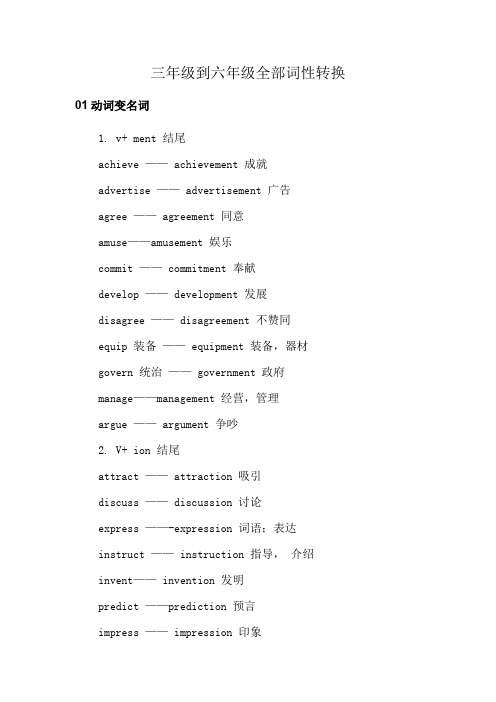
三年级到六年级全部词性转换01动词变名词1. v+ ment 结尾achieve —— achievement 成就advertise —— advertisement 广告agree —— agreement 同意amuse——amusement 娱乐commit —— commitment 奉献develop —— development 发展disagree —— disagreement 不赞同equip 装备—— equipment 装备,器材govern 统治—— government 政府manage——management 经营,管理argue —— argument 争吵2. V+ ion 结尾attract —— attraction 吸引discuss —— discussion 讨论express ——-expression 词语;表达instruct —— instruction 指导,介绍invent—— invention 发明predict ——prediction 预言impress —— impression 印象suggest ——suggestion 建议,暗示educate —— education 教育graduate —— graduation 毕业operate —— operation 操作,动手术illustrate —— illustration 阐明,举例说明pollute —— pollution 污染introduce ——introduction 介绍organize ——organization组织imagine —— imagination 想象力inspire——inspiration 灵感,鼓舞人心的invite —— invitation 邀请compete —— competition 竞争,比赛pronounce ——pronunciation发音admit —— admission 承认permit —— permission 允许conclude —— conclusion 结论decide —— decision 决定describe —— deion描写,描绘resolve —— resolution 决心solve ——solution 解决方法3.V+ ance 结尾allow —— allowance 允许appear —— appearance 外貌,出现perform —— performance 演出exist —— existance 存在4.V+ ing 结尾end —— ending 结尾,结局train ——training训练mean —— meaning 意义say—— saying 谚语remind —— reminding提醒bathe ——bathing沐浴5. 词尾加-er或-or后变成表示“某一类人”的名词work——worker 工人teach——teacher老师sing——singer 歌手jump——jumper跳高运动员play——player表演者、运动员learn——learner 学习者visit——visitor访问者invent——inventor发明家6.V+ 其他beg——beggar 乞丐sit——seat 座位believe —— belief 信仰behave —— behavior 行为know—— knowledge 知识fly—— flight 飞行mix —— mixture 混合物press —— pressure 压力serve —— service 服务succeed ——success 成功pursue —— pursuit 追求,从事propose —— proposal 建议withdraw —— withdrawal 取钱;收回;撤退survive —— survival--survivor 幸存者arrive —— arrival到达analyze —— analysis 分析02形容词变名词1. 词尾ent改为ency或enceefficient有效率的——efficiency 效率patient——patience/impatience 耐性/无耐心dependent——dependence依赖性independent——independency 独立性urgent——urgency 紧急2. ble结尾,ble改为bilitypossible——possibility 可能responsible——responsibility 责任;职责3. 其他accurate——accuracy 准确性prosperous——prosperity 繁荣true——truth 真相wide——width 宽度long——length 长度high——height 高度03名词/动词变形容词1. 名词+yhonest —— honesty 诚实的guilt 罪恶——guilty 内疚的health——healthy 健康的luck——lucky 幸运的cloud——cloudy 多云的wind—windy 多风的rain——rainy 多雨的snow——snowy 多雪的tourist —— touristy 游客多的er结尾,改er为ryhunger——hungry 饥饿的anger —— angry 生气的fog—— foggy 有雾的sun—— sunny 阳光灿烂的fur—— furry 毛皮的shine——shiny 发亮的taste —— tasty 美味的2. 名词/动词+ ed以辅音+辅音结尾的单词,直接加edtalent —— talented 有天赋的offend ——offended 生气的crowd ——crowded 拥挤的以元音字母e结尾的单词直接加dbalance —— balanced 平衡的organize——organized 有组织的pollute ——polluted 被污染的please ——pleased 高兴的元音加辅音结尾的单词,词尾辅音双写再加ed spot —— spotted 有斑点的3.名词+ ful/lesscare —— careful/ careless 小心的/ 粗心的help—— helpful / helpless 有帮助的/ 无助的use—— useful/ useless有用的 / 无用的meaning —— meaningful / meaningless有意义的/无意义的colour—— colourful /colourless多彩的/无色的pain 疼痛——painful /painless痛苦的/ 不痛的thank—— thankful / thankless 充满感激的/ 不知感恩的peace 和平—— peaceful 和平的play游戏—— playful 爱玩耍的home —— homeless 无家可归的4.名词/动词+ ablechange —— changeable 易变的adjust——adjustable 可调整的comfort——comfortable 舒适的knowledge——knowledgeable 知识渊博的suit ——suitable 合适的动词以辅音加y结尾把y变i 加able ,deny—— deniable 可否认的rely—— reliable 可靠的5. 名词+ ouscourage——courageous 勇敢的danger—— dangerous 危险的以y结尾,改y为i再加ousmystery 神秘—— mysterious 神秘的6. ce 变 tconfidence—— confident 自信的difference——different 不同的dependence —— dependent 依赖他人的independence—— independent 独立的7. 词尾加 aladdition—— additional 附加的,额外的music—— musical 音乐的person——personal (私人的) nation—— national 国家的education——educational有教育意义的tradition—— traditional 传统的origin起源——original 新颖的;独创的以元音字母结尾的单词,去掉词尾元音加al nature——natural 自然的globe—— global 全球的特例:class—— classical 经典的medicine 药——medical 医学的grammar—— grammatical 语法的8.名词+ lyfriend—— friendly 友好的live——lively 活跃的,有生气的love——lovely 可爱的week——weekly 每周的man——manly 男子气概的;强壮的9. 词尾+ enwood—— wooden 木制的wool—— woolen 羊毛的10. 表示方位的词East——easternWest——western South——southern North——northern11. 四大洲Asia 亚洲—— AsianAfrica 非洲——AfricanEurope欧洲—— EuropeanAmerica 美洲——American12. 其他energy精力——energetic 精力充沛的strategy——strategic 战略的scientist——scientific 科学的fool 傻子——foolish 愚蠢的love——loving 慈爱的pleasure——pleasant令人愉快的 / pleased高兴的pride——proud 自豪的04形容词变动词1. 词尾加izemodern——modernize 使...现代化social——socialize 使...社会化2. 词尾加enfast——fasten 使固定;集中于short—— shorten 缩短wide——widen 放宽less——lessen 使...减少特例(有变形):long——lengthen 使延长strong ——strengthen 加强;巩固3. 词前加enlarge —— enlarge 扩大;放大05形容词变副词1.形容词+ lybad——badly 坏地bright——brightly 明亮地casual——casually 随意地clear——clearly 清楚地complete——completely 完全correct——correctly 正确地final——finally 最后fortunate——fortunately幸运地general——generally 一般来讲loud——loudly 大声地particular ——particularly特别地polite——politely 礼貌地proper ——properly适当地main——mainly 主要地most ——mostly 多半,大多数normal——normally 正常地quick——quickly 迅速地quiet——quietly 轻轻地,安静地real——really 真正地recent ——recently 最近;近来sad——sadly 悲哀地slow——slowly 缓慢地special——specially 专门,特殊地specific——specifically 特定地,明确地strong——strongly 坚决地,强烈地sudden——suddenly突然usual——usually 通常2. 以le 结尾的,去e + y comfortable——comfortably 舒服地gentle——gently 温柔地possible——possibly 可能地simple——simply 仅仅;只;简单地terrible——terribly 非常;极度地3. 辅音字母+ y 变y为 ily easy——easily 容易地heavy——heavily 沉重地happy——happily 快乐地4. 特殊good——well好地true——truly 真实地。
六年级词性转换总结
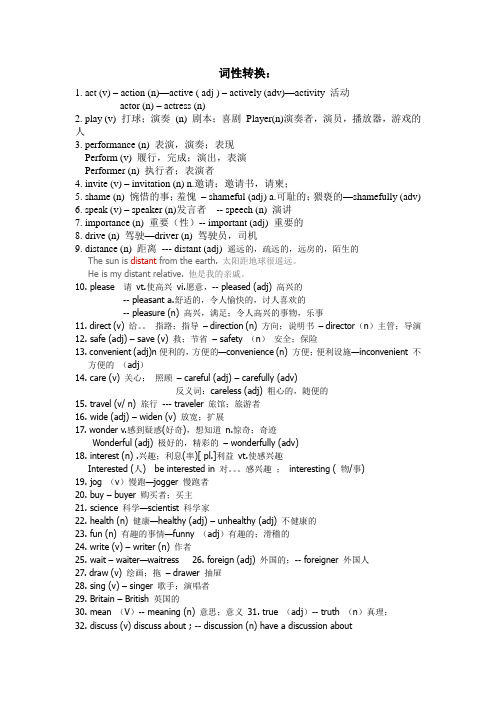
词性转换:1. act (v) – action (n)—active ( adj ) – actively (adv)—activity 活动actor (n) – actress (n)2. play (v) 打球;演奏(n) 剧本;喜剧Player(n)演奏者,演员,播放器,游戏的人3. performance (n) 表演,演奏;表现Perform (v) 履行,完成;演出,表演Performer (n) 执行者;表演者4. invite (v) – invitation (n) n.邀请;邀请书,请柬;5. shame (n) 惋惜的事;羞愧– shameful (adj) a.可耻的;猥亵的—shamefully (adv)6. speak (v) – speaker (n)发言者-- speech (n) 演讲7. importance (n) 重要(性)-- important (adj) 重要的8. drive (n) 驾驶—driver (n) 驾驶员,司机9. distance (n) 距离--- distant (adj) 遥远的,疏远的,远房的,陌生的The sun is distant from the earth. 太阳距地球很遥远。
He is my distant relative. 他是我的亲戚。
10. please 请vt.使高兴vi.愿意,-- pleased (adj) 高兴的-- pleasant a.舒适的,令人愉快的,讨人喜欢的-- pleasure (n) 高兴,满足;令人高兴的事物,乐事11. direct (v) 给。
指路;指导– direction (n) 方向;说明书– director(n)主管;导演12. safe (adj) – save (v) 救;节省– safety (n)安全;保险13. convenient (adj)n便利的,方便的—convenience (n) 方便;便利设施—inconvenient 不方便的(adj)14. care (v) 关心;照顾– careful (adj) – carefully (adv)反义词:careless (adj) 粗心的,随便的15. travel (v/ n) 旅行--- traveler 旅馆;旅游者16. wide (adj) – widen (v) 放宽;扩展17. wonder v.感到疑惑(好奇),想知道n.惊奇;奇迹Wonderful (adj) 极好的,精彩的– wonderfully (adv)18. interest (n) .兴趣;利息(率)[ pl.]利益vt.使感兴趣Interested (人) be interested in 对。
英语单词词性转换

英语单词词性转换(总4页)--本页仅作为文档封面,使用时请直接删除即可----内页可以根据需求调整合适字体及大小--英语单词词性转换一、动词(v.)→名词(n.)1、词尾加上-er或-or之后就变成了表示"某一类人"的名词例如:work—worker, teach—teacher, sing—singer,jump—jumper, play—player, learn—learner,visit—visitor, invent—inventor,collect—collector等.注意:1)以不发音的e结尾的动词,在词尾加-r.例如:drive—driver, write—writer等.2)以辅音字母开头并以元音字母加辅音字母结尾的单词,应双写末尾的辅音字母再加er。
例如:run—runner, win—winner,begin—beginner等.2.在动词词尾加上-ment 变成名词例如:achieve—achievement (成就)advertise—advertisement例如:argue—argument(争论)3.在动词词尾加上-(t)ion/(s)ion变成名词例如: attract—attraction; instruct—instruction;invent—invention discuss—discussion;express—expression educate—education;graduate—graduation; operate—operation (去e再加"ion")compete—competition; organize—organization (把e改成其他字母再加"tion")decide—decision conclude—conclusion (把de改为s再加"ion")describe—description描写,描绘 (这是特例,不规则变化)4.在动词词尾加上-ance变成名词例如: appear—appearance (外貌;出现)perform—performance (演出)accept—acceptance (接受)resist-resistance n.抵抗,阻力5.在动词词尾加-ing变成名词 (方法与动词变为现在分词的方法相同)例如:meet—meeting build—building wait—waiting bathe—bathing say—saying(谚语) mean—meaning注意:以辅音字母开头并以元音字母加辅音字母结尾的单词,应双写末尾的辅音字母再加-ing如:swim—swimming shop—shopping begin—beginning二、动词(v.)→形容词(adj.)1.动词后面加able,以e结尾的动词则去e加able,表示具有此性质,特点或属性.例如: afford-affordable;love-lovable2.动词后面加ed,以e结尾的动词则直接加d,表示被动性的属性或特点.例如: scatter-scattered use-used3不规则的动词则必须记忆,记住其过去分词形式.规律不大,意义同(b).三.名词(n.)→形容词(adj.)1.在名词后面加-y可以变成形容词(尤其是一些与天气有关的名词)例如: rain—rainy, cloud—cloudy, wind—windy, snow—snowy,health—healthy, luck—lucky,anger—angry guilt—guilty(内疚的)tourist—touristy(游客多的) , salt (盐)—salty (咸的)silk(丝绸)—silky(丝绸般的), sleep—sleepy (昏昏欲睡的)注意:1)如果以辅音字母开头并以元音字母加辅音字母结尾,这时应双写辅音字母再加"-y".如: sun—sunny, fun—funny, fog—foggy(有雾的), fur—furry(毛皮的)2)少数以不发音的e结尾的名词变为形容词时,应去掉e再加"-y".如: noise—noisy, ice—icy, shine—shiny(发亮的), taste(口味)—tasty(甜的)2.名词后面加-ed,以e结尾的直接加d.例如: spot(斑点)—spotted(有斑点的); talent—talented (有天赋的)organize—organized 有组织的; balance—balanced(平衡的)3.一些抽象名词在词尾加-ful可以变为形容词例如:care—careful, thank—thankful, help—helpful,use—useful, meaning—meaningful4.在名词后加-less构成含有否定意义的形容词例如:care—careless(粗心的), use—useless(无用的)hope—hopeless(没希望的),home—homeless(无家可归的)5.一些以-ce结尾的名词,把-ce改为-t变成形容词例如: difference—different, silence—silent, confidence—confident6.在名词后加-ly变为形容词例如: friend—friendly, love—lovely, live---lively7.在名词后加-ous变为形容词例如: danger—dangerous prosperous a 繁荣的(pro 在前+sper 希望+ous)8.名词后面加-al变为形容词例如: music—musical; medicine—medical (这个比较特殊)9名词后面加-able变为形容词,如果以e结尾就去e再加"-able".例如: adjust—adjustable 可调整的 value—valuable有价值的10.名词后面加-en变成形容词例如: wood—wooden 木制的 wool—woolen 羊毛的四.形容词(adj.)→副词(adv.)▲一般在形容词的词尾加-ly可以变成副词例如: quick—quickly, slow—slowly, loud—loudly, sudden—suddenly 等例如:possible—possibly, terrible—terribly。
小学六年级英语词形转换

小学六年级英语词形转换第一篇:小学六年级英语词形转换小学六年级英语词形转换1.写出下列各词的复数I _________him _________this ___________her ______ watch _______child _______photo ________diary ______ day________foot________book_______dress ________ tooth_______sheep ______box_______ strawberry _____ thief _______yo-yo ______peach______sandwich ______ man______woman_______paper_______juice____________water________milk__________rice____________tea_________ family knifebaby glass blouseboxphotowatch Chinesepeopledressis2.写出下列动词的第三人称单数drink__________go__________stay________make ____ look__________have_________pass_______carry ____ come________watch_______plant________fly ________ study________brush_________do___________teach__________ 3.写出下列动词的现在分词put__________give__________fly_________get ______ dance________sit__________ run ________plant ______ take________swim_________ask________stop _______ take ______write__________have_______smoke ______ makeeatpull4.写出下列动词的过去式isam_________fly_______plant________are ________ drink_________play_______go________make ________ does_________dance________worry________ask _____ taste_________eat__________draw________put ______ throw________kick_________pass_______do ________ givesitsingrun seemeetdraw have makeputbuyget taketastesay like come5.写出下列词的完全形式can’t_________I’d_________aren’t________they’re ____ let’s_________wasn’t_______that’s________don’t _____ when’s_______didn’t________you’re_______doesn’t ___ he’s________she’s________I’m_______isn’t _________ I’ve________shouldn’t_______I’ll_________who’s ______ 6.写出下列各词的反义词yes_________black________here_______new ________ different_______small_______go______early ________ right__________down________ask______behind_ _____ fat______noisy________ ill _ ________long__________ hot__________big________bad________busy____________heavy_________fast________low_______left _________ tall_________young________last____________open_____________ black sameupsitnewshortthere7.写出下列各词的近义词learn________find________near_______just now ______ look _______desk ______picture_______big__________ small__________tall__________listen__________quick____________nice_________ cup ______speak________ ___________ mum________dad________purse______ exciting _ ____ 8.写出下列各词的同音词to________by_______for________there ____________ see______right_______who’s_________I ___________ aren’t_______here___________father___________son__________pear________no____________be_______________hi__________第二篇:小学英语词形转换总结小学英语词形转换语法小结一、名词的复数(动词的第三人称单数形式)1、以s,x, ch, sh结尾的加es。
英语词性转换归纳

英语词性转换归纳在英语学习中,词性转换是一个非常重要的知识点。
它不仅能够帮助我们更准确地理解单词的含义,还能让我们在写作和表达中更加灵活地运用词汇。
下面就来对英语中的词性转换进行一个归纳总结。
一、名词转换为动词很多名词都可以通过添加特定的后缀或改变词形来转换为动词。
例如,“hand”作为名词是“手”的意思,而“hand in”则是动词短语,表示“上交”。
“face”作为名词是“脸”,“face the problem”就是“面对问题”,此时“face”用作动词。
还有一些名词通过词形变化转换为动词,比如“water”,作名词是“水”,作动词表示“浇水”;“rain”,名词是“雨”,动词则是“下雨”。
二、动词转换为名词动词转换为名词的方式也多种多样。
常见的是在动词后加上“ion”“ment”“ance”“ence”等后缀。
例如,“decide”(决定)变成“decision”(决定);“develop”(发展)变成“development”(发展);“appear”(出现)变成“appearance”(出现;外表);“refer”(参考;提及)变成“reference”(参考;提及;参考书目)。
有的动词通过词形变化成为名词,比如“fly”(飞)变成“flight”(飞行;航班);“choose”(选择)变成“choice”(选择)。
三、形容词转换为动词形容词转换为动词相对较少,但也有一些常见的例子。
比如,“empty”,作形容词是“空的”,用作动词表示“使……空”。
“slow”作形容词是“慢的”,“slow down”则是“(使)减速”。
四、形容词转换为名词形容词转换为名词的情况比较常见。
可以在形容词后加上“ness”“ity”“th”等后缀。
例如,“happy”(快乐的)变成“happiness”(快乐);“able”(能够的)变成“ability”(能力);“wide”(宽的)变成“width”(宽度);“long”(长的)变成“length”(长度)。
外研版六年级上学期英语词性转换(整理与复习)

词形转换1.factory (复数)2.foot(复数)3.left(对应词)4.quiet(对应词)5,easy(对应词)6.do(过去式)7.sea(同音词)8.I(宾格)9.bus(复数)10.China(全称)11.country(复数)12.build(名词)13.run(动名词)14.stamp(动名词)15.swim(动名词)16.have(动名词)17.shop(动名词)18.clap(动名词)19.climb(动名词)ugh(动名词)21.always(反义词)22.I would(缩写形式)23.stop(过去式)24.story(复数0 25.love(过去式)26.live(第三人称单数)e(现在分词)28.copy(第三人称单数)29.hour(同音异形词)30.give(第三人称单数)31.luck(形容词)32.hobby(复数)33.family(复数)34.knife(复数)35.have(第三人称单数)36.say(第三人称单数)37.you(宾格)38.we(宾格)39.they(宾格)40.that(复数)41.man(复数)42.woman(复数)43.America(形容词)44.Mexico(形容词)45.Canada(形容词)46.dance(名词)47.east(反义词)48.west(反义词)49.people(复数)50.look(第三人称单数)51.wind(形容词)52.hot(反义词)53.sun(形容词)54.cloud(形容词)55.rainy(名词)56.snowy(名词)57.many(比较极)58.have(过去式)59.shine(现在分词)60.send(现在分词)61.photo(复数)62.rain(现在分词)63.here (对应词)64.full(反义词)65.long(反义词)66.shop(复数)67.big(反义词)68.ride(动名词)69.collect(动名词)70.hear(同音词)71.rule(复数)72.stop(反义词)73.cool(反义词)74.no((同音词)75.let’s(完全形式)76.have not(缩写形式)77.I(形容词性物主代词)78.carry(第三人称单数)79.child(复数)80.please(形容词)81.much(比较极)82.this(复数)83.sound(第三人称单数)84.like(同义词)85.eight(序数词)86.meet(同音词)87.take(现在分词)88.two(序数词)89.write(现在分词)90.happy(近义词)91.there(同音异性词)92.these(对应词)93.miss(第三人称单数)94.he(宾格)95.good(比较极)96.where(同音异性词)97.eat(过去式)。
六年级英语词性转换单选题50题
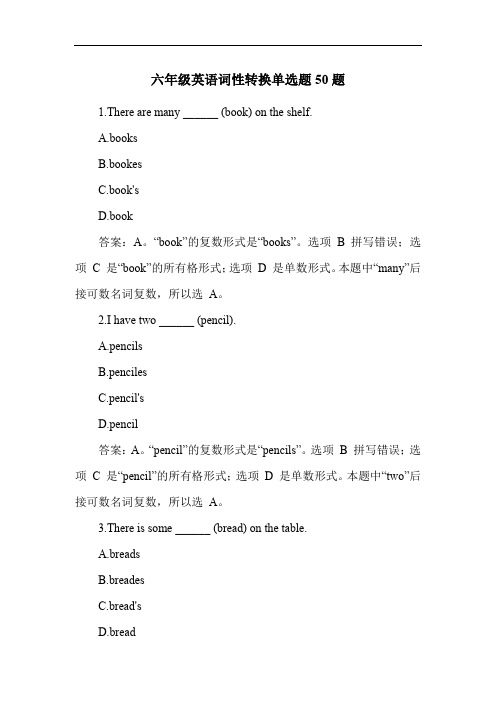
六年级英语词性转换单选题50题1.There are many ______ (book) on the shelf.A.booksB.bookesC.book'sD.book答案:A。
“book”的复数形式是“books”。
选项 B 拼写错误;选项C 是“book”的所有格形式;选项D 是单数形式。
本题中“many”后接可数名词复数,所以选A。
2.I have two ______ (pencil).A.pencilsB.pencilesC.pencil'sD.pencil答案:A。
“pencil”的复数形式是“pencils”。
选项B 拼写错误;选项C 是“pencil”的所有格形式;选项D 是单数形式。
本题中“two”后接可数名词复数,所以选A。
3.There is some ______ (bread) on the table.A.breadsB.breadesC.bread'sD.bread答案:D。
“bread”是不可数名词,没有复数形式。
选项A 和B 错误;选项C 是“bread”的所有格形式。
所以选D。
4.She has three ______ (apple).A.applesB.appleesC.apple'sD.apple答案:A。
“apple”的复数形式是“apples”。
选项B 拼写错误;选项C 是“apple”的所有格形式;选项D 是单数形式。
本题中“three”后接可数名词复数,所以选A。
5.There are a lot of ______ (student) in the classroom.A.studentsB.studentesC.student'sD.student答案:A。
“student”的复数形式是“students”。
选项B 拼写错误;选项C 是“student”的所有格形式;选项D 是单数形式。
本题中“a lot of”后接可数名词复数,所以选A。
六年级上册英语试题-词形变换动词过去式译林版(含答案)

六年级(上)期末专题练习2019.12【专题二词性变换】学生姓名: ____________(A)动词的过去式1. tell ___________________2. become3. bring ___________________4. can5. fly ___________________6. go7. see ___________________ 8. take9. say ___________________ 10. eat11. read ___________________ 12. teach13. shop ___________________ 14. buy15. drive ___________________ 16. drink17. clean ___________________ 18. close19. save ___________________ 20. protect21. use ___________________ 22. start23. know ___________________ 24. throw25. grow ___________________ 26. park27. rain ___________________ 28. smoke29. put ___________________ 30. cook31. look ___________________ 32. watch33. lose ___________________ 34. make35. do/ does ___________________ 36. am/ is37. are ___________________ 38. collect39. waste ___________________ 40. move41. walk ___________________ 42. laugh43. sit ___________________ 44. fit45. feel ___________________ 46. fall47. cry ___________________ 48. have49. pick ___________________ 50. wear51. listen ___________________ 52. talk53. tell ___________________ 54. speak55. climb ___________________ 56. ride57. try ___________________ 58. catch___________________ 60. point___________________ 62. spell ___________________ 64. receive ___________________ 66. keep ___________________ 68. give ___________________ 70. cut ___________________ 72. draw ___________________ 74. turn ___________________ 76. light ___________________ 78. shout ___________________ 80. help ___________________ 82. sing ___________________ 84. like ___________________ 86. show ___________________ 88. run ___________________ 90. work __________________ 92. find ___________________ 94. play ___________________ 96. water ___________________ 98. sleep ___________________ 100. show59. come 61. write 63. get 65. mean 67. plant 69. reuse 71. wash 73. leave 75. work 77. cheer 79. visit 81. think 83. dance 85. skate 87. swim 89. jump 91. wake 93. remembe r 95. get 97. slip 99.join参考答案 (A ) 动词的过去式1. tell told2. become became3. bring brought4. can could5. fly flied6. go went7. see saw8. take took9. say said 10. eat ate 11. read read 12. teach taught 13. shop shopped 14. buy bought 15. drive drove 16. drink drank 17. clean cleaned 18. close closed 19. save saved 20. protect protected21. use used 22. start started 23. know knew 24. throw threw 25. grow grew 26. park parked 27. rain rained 28. smoke smoked 29. put put 30. cook cooked 31. look looked 32. watch watche d33. lose lost 34. make made 35. do/ does did 36. am/ is was 37. are were 38. collect collecte d39. waste wasted 40. move moved 41. walk walked 42. laugh laughed 43. sit sat 44. fit fit/ fitted 45. feel felt 46. fall fell 47. cry cried 48. have had 49. pick picked 50. wear wore 51. listen listened 52. talk talked 53. tell told 54. speak spoke 55. climb climbed 56. ride rode 57. try tried 58. catch caught 59.comecame60. pointpointed61. write wrote 62. spell spelt6 3. get got 64. receive received65. mean meant 66. keep kept 67. plant planted 68. give gave 69. reuse reused 70. cut cut 71. wash washed 72. draw drew 73. leave left 74. turn turned 75. work worked 76. light lighted77. cheer cheered 78. shoutshout ed79. visit visited 80. helphelpe d81. think thought 82. sing sang 83. dance danced 84. like liked85. skate skated 86. showshowe d87. swim swam 88. run ran89. jump jumped 90. workworke d91. wake woke 92. find found 93. remember remembered 94. play played95. get got 96. waterwater ed97. slip slipped 98. sleep slept 99. join joined 100. miss missed。
英语单词词性转换
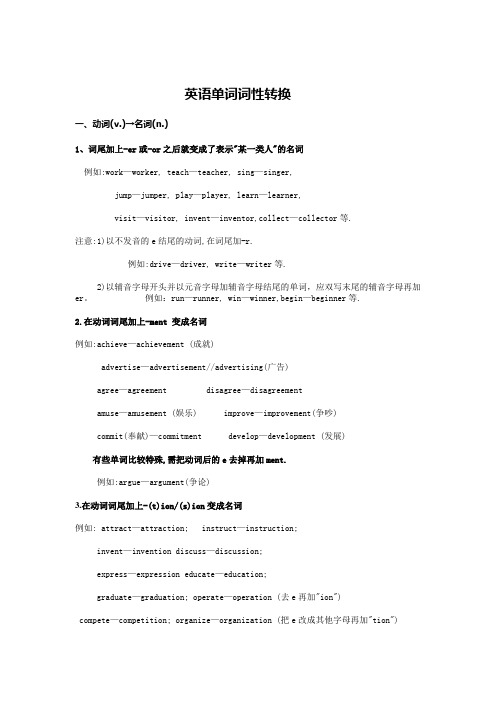
英语单词词性转换一、动词(v.)→名词(n.)1、词尾加上-er或-or之后就变成了表示"某一类人"的名词例如:work—worker, teach—teacher, sing—singer,jump—jumper, play—player, learn—learner,visit—visitor, invent—inventor,collect—collector等.注意:1)以不发音的e结尾的动词,在词尾加-r.例如:drive—driver, write—writer等.2)以辅音字母开头并以元音字母加辅音字母结尾的单词,应双写末尾的辅音字母再加er。
例如:run—runner, win—winner,begin—beginner等.2.在动词词尾加上-ment 变成名词例如:achieve—achievement (成就)advertise—advertisement//advertising(广告)agree—agreement disagree—disagreementamuse—amusement (娱乐) improve—improvement(争吵)commit(奉献)—commitment develop—development (发展)有些单词比较特殊,需把动词后的e去掉再加ment.例如:argue—argument(争论)3.在动词词尾加上-(t)ion/(s)ion变成名词例如: attract—attraction; instruct—instruction;invent—invention discuss—discussion;express—expression educate—education;graduate—graduation; operate—operation (去e再加"ion")compete—competition; organize—organization (把e改成其他字母再加"tion")decide—decision conclude—conclusion (把de改为s再加"ion")describe—description描写,描绘 (这是特例,不规则变化)4.在动词词尾加上-ance变成名词例如: appear—appearance (外貌;出现)perform—performance (演出)accept—acceptance (接受)resist-resistance n.抵抗,阻力5.在动词词尾加-ing变成名词 (方法与动词变为现在分词的方法相同)例如:meet—meeting build—building wait—waitingbathe—bathing say—saying(谚语) mean—meaning注意:以辅音字母开头并以元音字母加辅音字母结尾的单词,应双写末尾的辅音字母再加-ing如:swim—swimming shop—shopping begin—beginning二、动词(v.)→形容词(adj.)1.动词后面加able,以e结尾的动词则去e加able,表示具有此性质,特点或属性.例如: afford-affordable;love-lovable2.动词后面加ed,以e结尾的动词则直接加d,表示被动性的属性或特点.例如: scatter-scattered use-used3不规则的动词则必须记忆,记住其过去分词形式.规律不大,意义同(b).三.名词(n.)→形容词(adj.)1.在名词后面加-y可以变成形容词(尤其是一些与天气有关的名词)例如: rain—rainy, cloud—cloudy, wind—windy, snow—snowy,health—healthy, luck—lucky,anger—angry guilt—guilty(内疚的)tourist—touristy(游客多的) , salt (盐)—salty (咸的)silk(丝绸)—silky(丝绸般的), sleep—sleepy (昏昏欲睡的)注意:1)如果以辅音字母开头并以元音字母加辅音字母结尾,这时应双写辅音字母再加"-y".如: sun—sunny, fun—funny, fog—foggy(有雾的), fur—furry(毛皮的)2)少数以不发音的e结尾的名词变为形容词时,应去掉e再加"-y".如: noise—noisy, ice—icy, shine—shiny(发亮的), taste(口味)—tasty(甜的) 2.名词后面加-ed,以e结尾的直接加d.例如: spot(斑点)—spotted(有斑点的); talent—talented (有天赋的)organize—organized 有组织的; balance—balanced(平衡的)3.一些抽象名词在词尾加-ful可以变为形容词例如:care—careful, thank—thankful, help—helpful,use—useful, meaning—meaningful4.在名词后加-less构成含有否定意义的形容词例如:care—careless(粗心的), use—useless(无用的)hope—hopeless(没希望的),home—homeless(无家可归的)5.一些以-ce结尾的名词,把-ce改为-t变成形容词例如: difference—different, silence—silent, confidence—confident6.在名词后加-ly变为形容词例如: friend—friendly, love—lovely, live---lively7.在名词后加-ous变为形容词例如: danger—dangerous prosperous a 繁荣的(pro 在前+sper 希望+ous)8.名词后面加-al变为形容词例如: music—musical; medicine—medical (这个比较特殊)9名词后面加-able变为形容词,如果以e结尾就去e再加"-able".例如: adjust—adjustable 可调整的 value—valuable有价值的10.名词后面加-en变成形容词例如: wood—wooden 木制的 wool—woolen 羊毛的四.形容词(adj.)→副词(adv.)▲一般在形容词的词尾加-ly可以变成副词例如: quick—quickly, slow—slowly, loud—loudly, sudden—suddenly 等例如:possible—possibly, terrible—terribly。
英语词性转换归纳大全
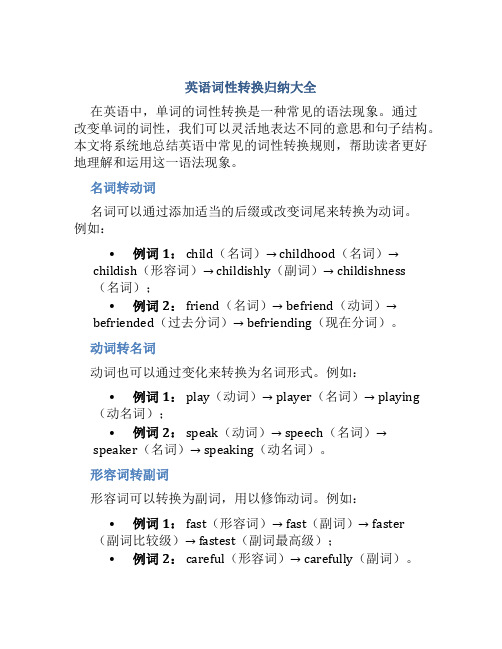
英语词性转换归纳大全在英语中,单词的词性转换是一种常见的语法现象。
通过改变单词的词性,我们可以灵活地表达不同的意思和句子结构。
本文将系统地总结英语中常见的词性转换规则,帮助读者更好地理解和运用这一语法现象。
名词转动词名词可以通过添加适当的后缀或改变词尾来转换为动词。
例如:•例词1: child(名词)→ childhood(名词)→ childish(形容词)→ childishly(副词)→ childishness(名词);•例词2: friend(名词)→ befriend(动词)→ befriended(过去分词)→ befriending(现在分词)。
动词转名词动词也可以通过变化来转换为名词形式。
例如:•例词1: play(动词)→ player(名词)→ playing (动名词);•例词2: speak(动词)→ speech(名词)→ speaker(名词)→ speaking(动名词)。
形容词转副词形容词可以转换为副词,用以修饰动词。
例如:•例词1: fast(形容词)→ fast(副词)→ faster (副词比较级)→ fastest(副词最高级);•例词2: careful(形容词)→ carefully(副词)。
副词转形容词副词可以转换为形容词,用以修饰名词。
例如:•例词1: highly(副词)→ high(形容词)→ highest(最高级形容词);•例词2: beautifully(副词)→ beautiful(形容词)。
名词转形容词名词也可以转换为形容词,用以修饰名词。
例如:•例词1: water(名词)→ watery(形容词)→ wateriest(最高级形容词);•例词2: music(名词)→ musical(形容词)→ musically(副词)。
形容词转名词形容词可以转换为名词,表示具有该特征的事物。
例如:•例词1: poor(形容词)→ the poor(名词,贫穷者);•例词2: young(形容词)→ the young(名词,年轻人)。
词性变化和词性转换
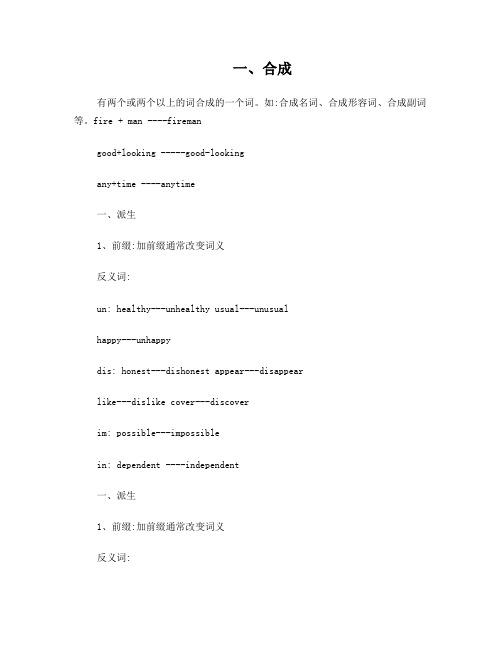
一、合成有两个或两个以上的词合成的一个词。
如:合成名词、合成形容词、合成副词等。
fire + man ----firemangood+looking -----good-lookingany+time ----anytime一、派生1、前缀:加前缀通常改变词义反义词:un: healthy---unhealthy usual---unusualhappy---unhappydis: honest---dishonest appear---disappearlike---dislike cover---discoverim: possible---impossiblein: dependent ----independent一、派生1、前缀:加前缀通常改变词义反义词:un: healthy---unhealthy usual---unusualhappy---unhappydis: honest---dishonest appear---disappearlike---dislike cover---discoverim: possible---impossiblein: dependent ----independent2、后缀:加后缀一般改变词性(1)名词后缀:-er: manage—manager, own---owner, record---recorder report---reporter, teach---teacher, wait---waiterwin----winner, work---worker , write---writer--or: visit---visitor , act---actor, invent---inventor -ress: wait---waitress, act---actress-(t)ion: invent—invention, pollute---pollution, attract—attraction, suggest---suggestioncollect---collection, locate---location,operate---operation, protect---protectionsolve---solution, add---addition2、后缀:加后缀一般改变词性(1)名词后缀:-ation: invite---invitation, organize---organization-(s)ion: discuss---discussion, decide---decision-ment: develop---development, amuse—amusementadvertise---advertisement-ce: enter---entrance-ing: meet---meeting, paint---painting, say---saying begin---beginning, build---building2、后缀:加后缀一般改变词性(2)名词+ist ; er变成表示人的名词-ist: science--scientist, art—artist, tour—tourist-er: farm---farmer, engine---engineer, law---lawyer(3)形容词+ness, ty,ity, th, ce, dom变成名词-ness: kind—kindness, ill—illness;-ty: safe—safety, difficult—difficulty, honest—honesty-ity: electric—electricity, national—nationality,active—activity, able—ability-th: true—truth, long—length-ce:different—difference, important—importance-dom: free—freedom, wise—wisdom,(2) 动词后缀:1.名词+ize变成动词:-ize: memory---memorize2. 形容词+en 变成动词:wide—widen(3). 形容词后缀:1.名词+ed, ful, y, ly, ive, al, cal, en, (i)an变成形容词-ed: age—aged, wound—wounded-ful: power—powerful, care—careful, use—useful success—successful, wonder—wonderful-y: wind—windy, rain—rainy, cloud—cloudysnow—snowy, sun—sunny, luck—luckynoise—noisy, health—healthy, fun—funny,-ly: love—lovely, friend—friendly,-ive: act—active-al: education—educational, office—official, nation—national, nature—natural, person—personal, tradition—traditional, physical—physical-cal: history—historical, chemistry—chemical, medicine—medical-en: gold—golden, wood—wooden-(i)an: Australia—Australian, Canada—Canadian Italy—Italian, America—American(4)名词+less 变成形容词,有相反的意思-less: home—homeless, care—careless, help—helpless life—lifeless, use—useless;动词+ful, able, ive变成形容词:-ful: forget—forgetful, help—helpful, thank—thankful -able: avail—available, enjoy—enjoyable, change—changeable,-ive: attract—attractive动词+ed, ing变成形容词-ed: wound—wounded, fry—fried, please—pleased, surprise—surprised, interest—interested,excite—excited-ing: amuse—amusing, interest—interestingsurprise—surprising, excite--exciting(4)副词后缀:形容词+y, ly 变副词-y: gentle—gently, possible—possibly-ly: accurate—accurately, angry—angrily,beautiful—beautifully, general—generally,clear—clearly, complete—completely, final—finally lucky—luckily, loud—loudly, main—mainly,quick—quickly, quiet—quietly, real—really,recent—recently, usual—usually, safe—safelyslow—slowly, serious—seriously, soft—softlywide—widely, true—truly, careful—carefully,happy—happily, heavy—heavily,immediate--immediately(5)基数词后缀:-teen : four—fourteen, five—fifteen, …-ty: three—thirty, eight—eighty,(6) 序数词后缀:-th: five-fifth, six---sixth, nineteen—nineteenth, ninety-ninetieth, nine—ninth特别注意:one—first—firstly—oncetwo—second—secondly--twice1、make a phone call-----call me later2、change her idea---offer me some changes3、clean our classroom---keep our classroom clean4、be sunny and clear---clear the street5、cook food----a chief cook6、get a thorough check---check our homework7、correct our mistakes---a correct answer8、keep us cool---cool the milk9、in the dark---dark brown10、from a desire to become rich---desire happiness11、leave early-----early morning12、on my other hand----hand me his book13、a hard apple----work hard14、hurry to school ----in a hurry15、look like ----have a look at16、work late ----at a late hour---be late for17、process our problem ---a long process18、water flowers---enough water19、weak light----light enough for me to lift20、walk straight----a straight line21、some books---book a hotel22、break the rules----have a break23、a bright boy----a pair of bright eyes24、a book in a case----deal with a case25、catch the bus---catch the thief—catch a cold---catch what you said26、live in the country----work for our country27、walk through the crowd----be crowded with28、my dear---a dear earring29、my experiences in England----be full of experience30、I don’t know if…,////If it rains,….31、run fast----run a restaurant32、happen to do / happen on Friday33、manage to do sth./ manage a company34、the rest of time / have a rest35、be present a meeting----give me a present----at present36、still live there-----keep still/stay still----still taller37、take away---take notes---take a pill---take a bus----It takes sb. some time to do…-----take photos38、look after patients-----be patient to students39、Yes, I will.-----Will you…..------a strong willWhen there is a will, there is a way.40、by train----train us to be excellent ones41、get along/on with sb. ----- get along /on with our work42、go ahead , you’ll find a school on your right.-----May I ask you a question? Go ahead.43、go in for = take part in------go in for = be fond of44、our plane will take off-------take off your coat45、look up at the Oriental Pearl TV Tower= look up a word in the dictionary46、run/ be out of food--------walk out of the classroom47、put on my coat---put on my glasses----put on a play48、take place= be held; take place= happen。
上海六年级英语词性转换

词性转换第一天名词1. She thought theyoung man was a queue _______ (jump).2. The three _______(visit) came to my house last Sunday.3. My uncle is avery good _______ (surf).4. Elaine went outside to _______ the playingfield. After his _______, he went home.(inspector)5. Tea contains caffeine. It's bad for your_______.(unhealthy)答案解析1. jumper。
固定搭配jump a queue解释为插队。
反过来,插队的人要在动词jump后加上er表示人。
2. visitors。
Visit是动词,根据句意,填空处需要名词,表示人,所以加or。
3. surfer。
道理同上,填空处需要表示人的名词,加er。
4. inspect,inspection。
考法反过来,给的词是人。
第一个空需要的是动词,第二个空需要的是名词,所以去掉or是动词,动词是t结尾,变成tion就是名词。
虽然不是所有t结尾的动词都可以变成tion结尾的名词,但是这个概率很大,所以在不会做题时可以这么做。
5. health。
给的是一个反义形容词,填空处需要名词,所以需要否定前缀以及形容词后缀。
总结:今天的重点是表示人的名词和其动词之间的转换,注意积累哦第二天名词1. Thousands of _______were lost inthe earthquake happened in Japan.(life)2. John told us that he had madefriends with a few________ on the Facebook.(Germany)3. March 8 is _________Day.(woman)4. The room is so dirty that a lotof _______ can be seen running here and there. (mouse)5. My mother bought some _______yesterday. (tomato)答案解析:1. lives。
最新上海六年级英语词性转换

词性转换第一天名词1. She thought theyoung man was a queue _______ (jump).2. The three _______(visit) came to my house last Sunday.3. My uncle is avery good _______ (surf).4. Elaine went outside to _______ the playingfield. After his _______, he went home.(inspector)5. Tea contains caffeine. It's bad for your _______.(unhealthy)答案解析1. jumper。
固定搭配jump a queue解释为插队。
反过来,插队的人要在动词jump后加上er表示人。
2. visitors。
Visit是动词,根据句意,填空处需要名词,表示人,所以加or。
3. surfer。
道理同上,填空处需要表示人的名词,加er。
4. inspect,inspection。
考法反过来,给的词是人。
第一个空需要的是动词,第二个空需要的是名词,所以去掉or是动词,动词是t结尾,变成tion就是名词。
虽然不是所有t结尾的动词都可以变成tion结尾的名词,但是这个概率很大,所以在不会做题时可以这么做。
5. health。
给的是一个反义形容词,填空处需要名词,所以需要否定前缀以及形容词后缀。
总结:今天的重点是表示人的名词和其动词之间的转换,注意积累哦!!!!第二天名词1. Thousands of _______were lost inthe earthquake happened in Japan.(life)2. John told us that he had madefriends with a few ________ on the Facebook.(Germany)3. March 8 is _________Day.(woman)4. The room is so dirty that a lotof _______ can be seen running here and there. (mouse)5. My mother bought some _______yesterday. (tomato)答案解析:1. lives。
- 1、下载文档前请自行甄别文档内容的完整性,平台不提供额外的编辑、内容补充、找答案等附加服务。
- 2、"仅部分预览"的文档,不可在线预览部分如存在完整性等问题,可反馈申请退款(可完整预览的文档不适用该条件!)。
- 3、如文档侵犯您的权益,请联系客服反馈,我们会尽快为您处理(人工客服工作时间:9:00-18:30)。
期中复习
一、词性变换
1、come(变现在分词)—coming
2、get(变过去分词)—got
3、work(单三)——works
4、say(单三)——says
5、smile(单三)——smiles
6、people(复数)——people
7、make(过去式)——made 8、ride(现在分词)——riding
9、good(比较级)——better 10、good(最高级)——best
11、she(宾格)——her 12、west(形容词)——western
13、east(形容词)——eastern 14、south(形容词)——southern
15、smile(现在分词)——smiling 16、cry(现在分词)——crying
17、friend(形容词)——friendly 18、I (宾格)——me
19、I(形容词性物主代词)——my 20、he(宾格)——him
21、buy(单三)——buys 22、child(复数)—children
23、must not (缩写)——must n’t 24、go (现在分词)——going
25、have(单三)——has 26、eye(复数)——eyes
27、family(复数)——families 28、Lucy(名词所有格)——Lucy’s
29、right(反义词)——left 30、south(对应词)——north
31、this(复数)——these 32、this(对应词)——that
33、these(对应词)——those 34、sound(单三)——sounds
35.、shop(现在分词)——shopping 36、down(对应词)——up
37、take(现在分词)——taking 38、do(单三)——does
39、monkey(复数)——monkeys 40、know(同音词)——no
41、there(同音词)——their 42、fox(复数)——foxes
43、China(形容词)——Chinese 44、soup(复数)——soups
45、mango(复数)——mangoes 46、beef(复数)——beef
47、Let us(缩写))——Let’s 48、prefer(单三)——prefers
49、knee(复数)——knees 50、care(形容词)——careful
51、teach(名词)——teacher 52、hair(形容词)——hairy多毛的
53、share(现在分词)——sharing 53、hurt(过去分词)——hurt。
